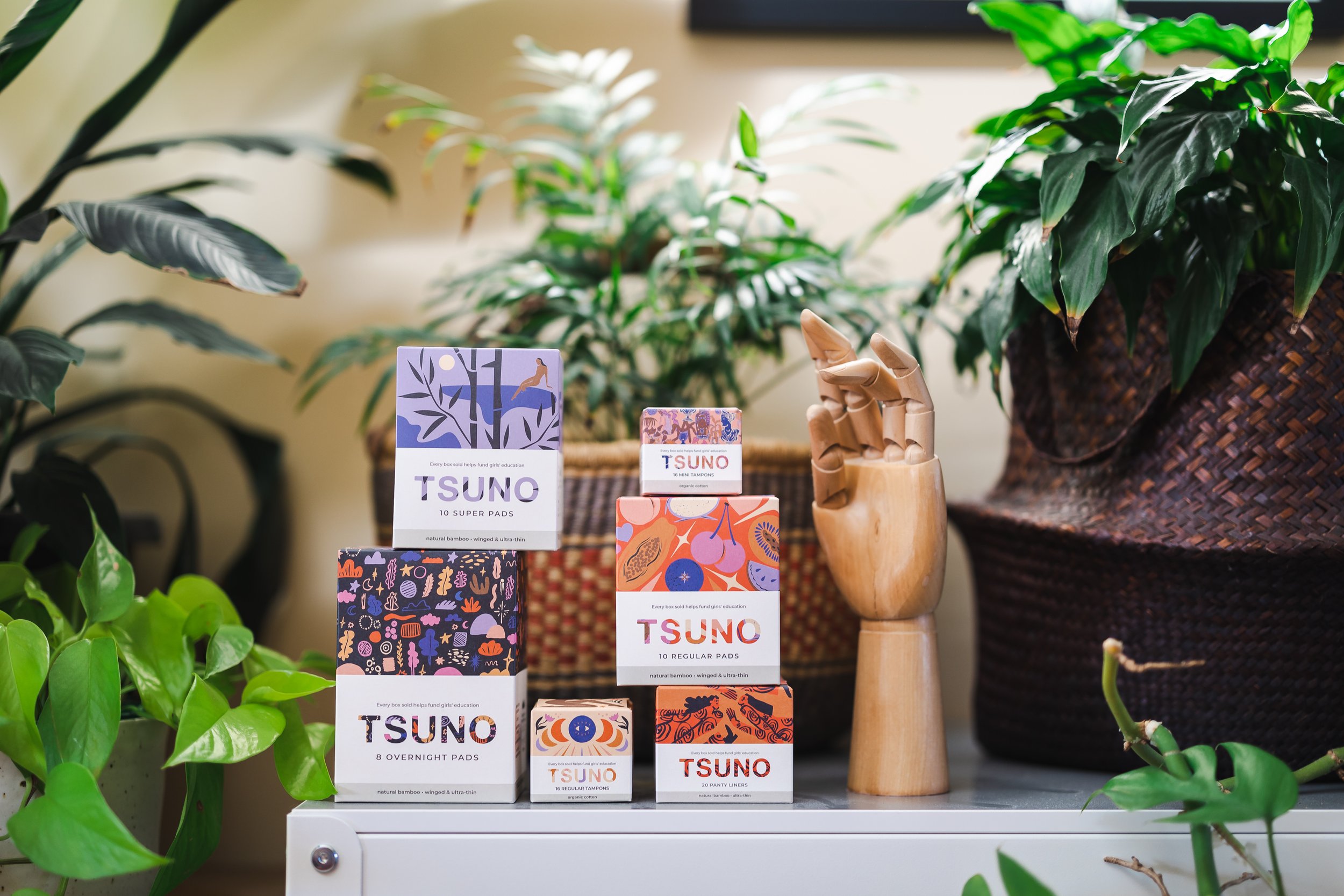Roz Campbell is the founder of social enterprise Tsuno
Roz Campbell is a designer living in Melbourne, Australia. She founded, and for the last 10 years has been running Tsuno, a social enterprise supplying bamboo fibre pads and organic cotton tampons, which donates 50% of profits to charities empowering women and girls living in poverty.
Tell us a little bit about yourself and Tsuno:
Hi! My name is Roz and I am a 37 year old lady living in Melbourne. I have a curious, adventurous mind and I love to create things. I recently finished a degree in Industrial Design that took me 10 years to complete. I start new creative (mainly furniture making) projects all the time and leave them sitting unfinished for years, and I also daydream about new business ideas a lot. One business idea that started as a daydream 10 years ago, but managed to be seen through to some form of functioning operation is Tsuno, my business selling bamboo fibre sanitary pads and organic cotton tampons. It is a social enterprise that exists to donate 50% of its profits to charities that are supporting women and girls living in poverty. One of the amazing charities I support through Tsuno is One Girl, they work in Sierra Leone providing education scholarships, sexual and reproductive health education, and also, sanitary pads, to girls who without their support would go without. Tsuno also donates thousands of boxes of period products each year to local charities in Australia, supporting people seeking asylum and experiencing homelessness or period poverty, such as The ASRC, Happy Boxes, Pinchapoo and Share the Dignity.
When did your passion for periods begin?
It began in April 2011 (yes specific I know) when I got my period whilst on a trip visiting a friend in Finland. I asked her from the toilet if she had any pads or tampons I could use, and she informed me that she didn’t use those, and used a menstrual cup. I had never heard of a menstrual cup at the time (this was 12 years ago to give context because menstrual cups are now so mainstream they are in Woolworths!) and from a product design point of view I was very interested in sustainability and it ignited my interest in periods, what products were available, and how little product innovation had occurred in the space. I loved the idea of the cup, but for me it didn’t work too well, so I thought I could maybe innovate it. One of my amazing lecturers in my industrial design course at RMIT recognised this interest and she invited the founder of the charity One Girl to come to talk to our class. In the talk I was introduced to the concept of period poverty and how lack of access to safe and effective methods of managing menstruation can impact the ability for people to access education. My mind was expanded and I was on this period passion journey from that point on.
Tsuno helps a lot of charities including Share the Dignity, why is it important for you to give back?
Giving back is the foundation of the business. I wanted a way to support One Girl’s work from the very beginning. Recognising my privilege in this world and using that privilege in a way that is positive, even on a small scale helps me to feel good, and I like waking up each day feeling good about what I am doing. If I had to run a business that was just about making lots of money for myself, I know I would personally lose interest very quickly and it would make it very difficult to remain resilient in the face of the challenges that are inevitably faced by small (and big) businesses. I understand I don’t find motivation that way, and so I am very lucky that I have been able to run a small business for almost 10 years that suits my way of life and supports others in the process. Even though the intention for Tsuno is to support other people, that is only possible because of the support and encouragement I get from my customers, suppliers, distributors and other wonderful relationships I have forged in this industry, who I know are also very motivated by the giving back aspect of Tsuno.
What do you want people to know about period poverty today?
Well, on this day today, there are approximately 130 million girls not in school due to a number of barriers including poverty, child marriage, gender based violence and lack of access to safe and hygienic sanitation needs. To translate, some of those 130 million girls are not at school because of period poverty. They don’t have a safe and hygienic bathroom at school to manage their menstruation, or they don’t have access to products that help them manage it safely and hygienically. A slight but still relevant deviation; I have my period right now and just got up mid paragraph to go to the toilet, changed my pad, cleaned myself and came back to my desk to get on with my work- I wanted to illustrate the contrast I, and most likely you the reader, are living compared to hundreds of millions of people living without access to facilities and products like this. 130 million girls are not in school. Hygiene poverty, period poverty, it is happening in almost every country in the world, including our own. What are we doing? Why haven’t we humans sorted this out yet? Why isn’t every Australian who can afford period products using Tsuno? I have so many questions.
Can you share a funny/heartwarming period story with us to finish up?
A few times I have done a personal fundraiser for One Girl where I replace my pads or tampons whilst menstruating with materials I have heard the girls in Sierra Leone use when they can’t access or afford pads. I’ve used kitchen sponges, newspaper, socks, rags, leaves and toilet paper, and told everyone who will listen to donate on my behalf to One Girl so one less girl will have to endure that each month. Because I am running a small business and often have to do most things myself, my challenge one time coincided with a number of pallets of tampons being delivered, which I had to unload and put away in my storage facility. The storage facility had a weird ramp situation, and my trolley was about to get away from me, so I had to run around to the front of it and use all my force to stop a pallet filled with about 80 000 tampons from escaping and doing damage to the wall, and because I was straining so much, my period, which was being managed on that day by a sock, just squeezed itself out of me all down my leg and all I could do was laugh at the irony of having that happen because of that situation. Was this funny or heartwarming? I’m not sure.
Photographs Jessica Prescott, Interview Freya Bennett




